Search
Did you mean: Thera?
Search Results

Image
Theatre in Leptis Magna, Reconstructed
This modern reconstruction digitally restores a Roman theatre in Leptis Magna. Located in Khoms, Libya.
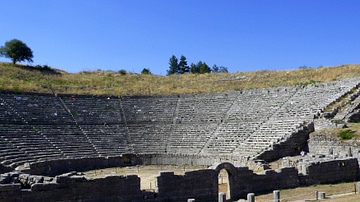
Image
Theatre of Dodona
The theatre of Dodona, 3rd century BCE.
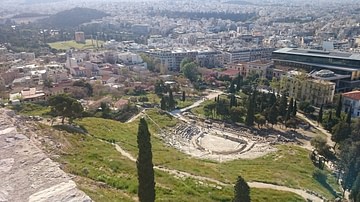
Image
Theatre of Dionysus - Acropolis, Athens
A few things are visible in this picture. The theatre of Dionysus Eleuthereus: Construction: 6th-4th century BCE The temple of Olympian Zeus to the left: Construction: 2nd century CE The Panathenaic Stadium to the far left: Construction...

Image
Theatre Parodoi, Epidaurus
A view of the parodoi - the monumental gate entrances common to Classical theatres through which the audience entered the theatre.

Image
Theatre of Petra
Carved into the side of the mountain at the foot of the High Place of Sacrifice, the theatre of Petra consists of three rows of seats separated by passageways. Seven stairways ascended the cavea (seating section) which accommodated 4000 spectators...
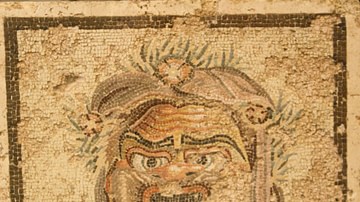
Image
Theatre Mask Mosaic, Empuries
A 1st century BCE Roman floor mosaic emblemata depicting a theatre mask. From a bedroom, domus no.1, Empuries (Emporiae), Spain. (Archaeological Museum, Empuries)
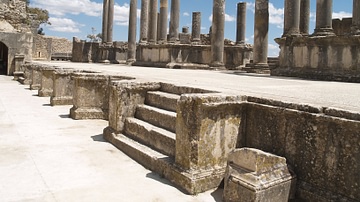
Image
Theatre of Thugga
The stage of the Roman theatre of Thugga (Dougga), North Africa (168-169 CE)

Image
Theatre, Metapontum
The mid-4th century BCE theatre at Metapontum, Magna Graecia, southern Italy.
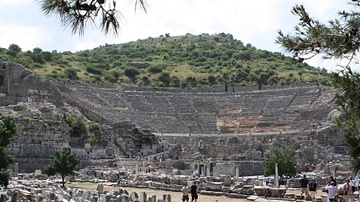
Image
Theatre of Ephesus
The theatre of Ephesus, Turkey, was constructed c. 300 to c. 290 BCE and built into the hill of Panayir Dagi.

Collection
Comedy & Tragedy: the Drama of Greek Theatre
Greek theatre likely sprang from the lyrical performance of ancient epic poetry and the rituals performed in the worship of the god Dionysos where goats were sacrificed and participants wore masks. From the 6th century BCE, Greek tragedy...